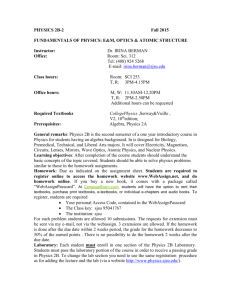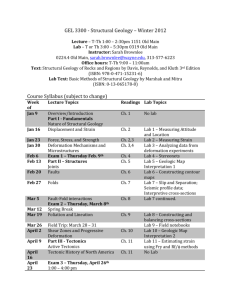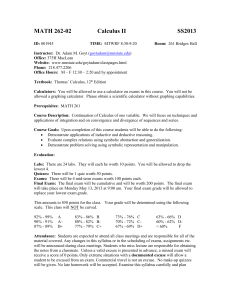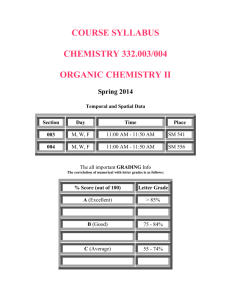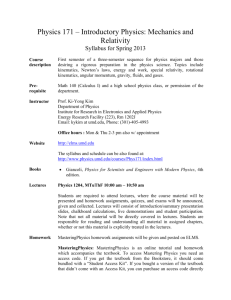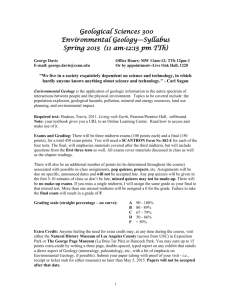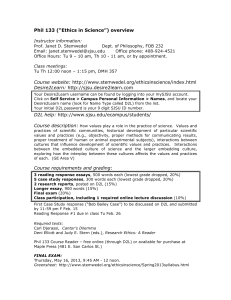San José State University Geology 7: Earth, Time, and Life (Sec. 2
advertisement
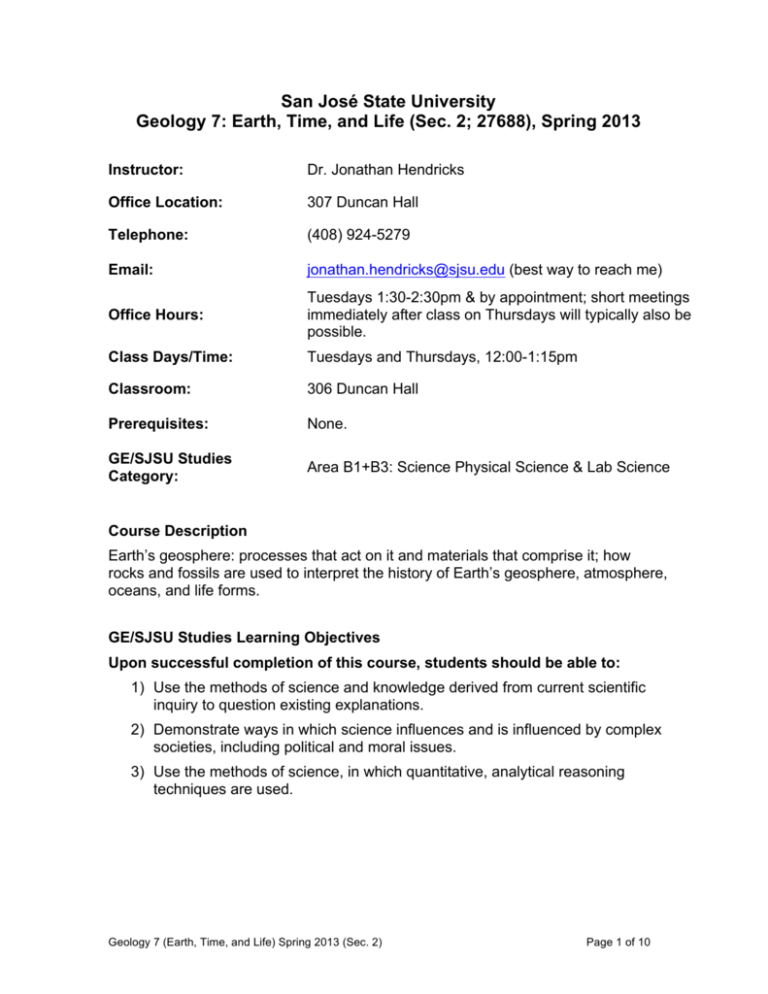
San José State University Geology 7: Earth, Time, and Life (Sec. 2; 27688), Spring 2013 Instructor: Dr. Jonathan Hendricks Office Location: 307 Duncan Hall Telephone: (408) 924-5279 Email: jonathan.hendricks@sjsu.edu (best way to reach me) Office Hours: Tuesdays 1:30-2:30pm & by appointment; short meetings immediately after class on Thursdays will typically also be possible. Class Days/Time: Tuesdays and Thursdays, 12:00-1:15pm Classroom: 306 Duncan Hall Prerequisites: None. GE/SJSU Studies Category: Area B1+B3: Science Physical Science & Lab Science Course Description Earth’s geosphere: processes that act on it and materials that comprise it; how rocks and fossils are used to interpret the history of Earth’s geosphere, atmosphere, oceans, and life forms. GE/SJSU Studies Learning Objectives Upon successful completion of this course, students should be able to: 1) Use the methods of science and knowledge derived from current scientific inquiry to question existing explanations. 2) Demonstrate ways in which science influences and is influenced by complex societies, including political and moral issues. 3) Use the methods of science, in which quantitative, analytical reasoning techniques are used. Geology 7 (Earth, Time, and Life) Spring 2013 (Sec. 2) Page 1 of 10 Course Content Learning Objectives Upon successful completion of this course, students will be able to: 1) Explain how the development of plate tectonic theory led to an understanding of the global distribution of earthquakes and volcanoes. 2) Examine the ways in which scientists, politicians, governments, communities, and individuals approach issues associated with teaching science and the nature of scientific inquiry, energy and natural resources. 3) Use lab skills such as observation, description, classification, map reading, data analysis, and graphing in order to understand how such data are acquired and applied in the physical sciences. Desire 2 Learn (D2L) Important announcements and critical materials for this course (including lecture slides and study guide questions) will be distributed electronically using Desire 2 Learn (D2L), which may be accessed online at http://sjsu.desire2learn.com. Students may also use D2L to check their grades throughout the semester. See the following website for details on how to access D2L: http://www.sjsu.edu/ecampus/students/. Textbooks No required textbooks. Critical course readings, however, will be assigned and a schedule of required reading assignments will be posted on D2L and will be updated throughout the semester. These readings will be freely accessible as PDF files through the San Jose State University Library by using Electronic Course Reserves (ECR), which may be accessed here: http://library.sjsu.edu/coursereserves/course-reserves. Expect about one or two book length chapters to be assigned per week. Lecture Slides and Study Guides PDF copies of the lecture slides and associated study guide questions will typically be posted to D2L by the evening before class. Feel free to print these materials and bring them with you to class (copies will not generally be provided to you in class). Geology 7 (Earth, Time, and Life) Spring 2013 (Sec. 2) Page 2 of 10 Classroom Protocol All students are expected to act civilly and respectfully during class time. This means: no excessive talking/whispering during lecture, no talking on cell phones or sending text messages (turn OFF and put away cell phones before class starts; TEXTING DURING CLASS IS RUDE), no use of laptops for purposes other than taking notes, etc. If you use a laptop during lecture (for Geology 7 related activities, not email, social networks, games, web surfing, etc.), please sit at the back of the classroom so that you do not distract students sitting behind you; cords may not be extended across walking spaces. If you are caught using a laptop, cell phone, or other portable electronic devise during a quiz or exam, it will be assumed that you are using it to cheat and you will receive a score of zero and will be reported to the University for academic misconduct. If you have to arrive late or leave early, be as quiet and considerate as possible – DO NOT make this a regular habit. Any activities deemed disruptive will be met with appropriate disciplinary action, including expulsion from the classroom. Students are welcome to raise their hands and ask me questions when called upon. I expect e-mails to me to be respectful and professional; I will do my best to respond to such e-mails within 24 hours. Dropping and Adding Students are responsible for understanding the policies and procedures about add/drops, academic renewal, etc. Information about late drop is available at http://www.sjsu.edu/aars/policies/latedrops/policy/. Students are responsible for being aware of the current deadlines and penalties for adding and dropping classes. Success Success in this course is based on the expectation that students will spend, for each unit of credit, a minimum of forty-five hours over the length of the course (normally 3 hours per unit per week with 1 of the hours used for lecture) for instruction or preparation/studying or course related activities including but not limited to internships, labs, clinical practica. Other course structures will have equivalent workload expectations as described in the syllabus. Geology 7 (Earth, Time, and Life) Spring 2013 (Sec. 2) Page 3 of 10 Assignments and Grading Policy There will be a total of 2000 points available in the course; 1500 of these points pertain to the lecture part of the class and 500 pertain to the laboratory (the laboratory is part of the class, so you will not receive a separate final grade for it): • Exams (two midterms + final): 1000 pts. (50%) • Quizzes: 240 pts. (12%) • Writing Assignment: 260 pts. (13%) • Laboratory Exercises & Practical Exams: 500 pts. (25%) Final grades—based upon percentages of the total points available—will be calculated using the following distribution: 99% to 100% A+ 93% to <99% A (excellent) 90% to <93% A87% to <90% B+ 83% to <87% B (good) 80% to <83% B77% to <80% C+ 73% to <77% C (adequate) 70% to <73% C65% to <70% D+ 60% to <65% D (poor) 50% to <60% D<50% F (failure) It is possible that a downward adjustment, to a maximum of 10 percentage points, may be made to this scale at the end of the semester if the final overall median point total for all work turned in by all students is less than 80%. In such a case, the grade scale will be shifted downward by the difference between the median score and 80%. For example, if the final median grade percent is 75%, attaining 85% of the total points will earn you an A- in the course. The grade scale will not be shifted upwards (if you earn at least 93% of the total points, you are guaranteed an A in the class). An unadjusted score of 99% (or higher) will be required to attain a final grade of A+. Students will be able to track their scores throughout the semester by using Desire 2 Learn. Exams (1000 pts.) There will be a total of three exams: two in-class midterms (Feb. 28 and Apr. 11) and a final exam (May 16). Each exam will feature a combination of multiple-choice, true-false, and/or short-answer questions (the format of each exam will be announced in class prior to the exam). Exam questions will be based on material covered in lecture and also in the readings; while studying, focus your attention on material highlighted by the study guide questions. Nevertheless, all material covered in the lectures—whether it appears on a lecture slide or not—is considered “fair game” for exam questions. The two midterm exams (Exams 1 and 2; 300 points each) will successively cover approximately one-third of the course material; Geology 7 (Earth, Time, and Life) Spring 2013 (Sec. 2) Page 4 of 10 the final exam (400 points) will focus on material covered during the last third of the course, but will also contain questions regarding material covered earlier in the course. Quizzes (240 pts.) A total of 13 quizzes, worth 20 points each, will be administered throughout the course of the semester. These will consist primarily of quizzes that will be completed outside of class using Desire 2 Learn, but may also include some popquizzes given during lecture. You will be quizzed on material covered in lecture and also in the readings (typically 2-3 lectures worth of material per quiz); focus your attention on material highlighted by the study guide questions. Nevertheless, all material covered in the lectures—whether it appears on a PowerPoint slide or not— is considered “fair game” for quiz questions. Frequently, online quizzes will be assigned on Thursday and will be due online at 11:59PM the following Monday. Your single lowest quiz score will be dropped when computing final grades. Writing Assignment (260 pts.) There will be one major writing assignment (1500+ words, or ~5-6 pages in length) that will be worth a total of 260 points. Details on this writing assignment will be provided later. The writing assignment will be assigned on Mar. 19 and will be due at the start of class time on Apr. 23. Laboratory (500 pts.) The Geology 7 laboratory will be administered by a teaching assistant (TA). There will be a total of 11 laboratory exercises, each of which will be worth 30 points. Lab exercises are due at the end of the lab period. The single lowest lab score will be dropped when calculating final grades. Due to space limitations, you must attend the laboratory section for which you are registered. While you will be allowed to work on many of the lab exercises in small groups, the work that you turn in must be your own (i.e., presented in your own words). Cheating on lab exercises (e.g., copying answers) will not be tolerated and will result in the following consequences: 1) all students involved will be referred to the University for Academic Misconduct; 2) all students involved will receive a grade of zero on the lab (which will not be dropped); 3) all students involved will have an additional 30 points dropped from their final grade calculation at the end of the semester. A second instance of cheating on laboratory exercises will result in a failing grade in the course. There will also be two laboratory practical exams. The first (Week 7, covering Labs 2-5) will be worth 80 points; the second (Week 16, cumulative) will be worth 120 points. Geology 7 (Earth, Time, and Life) Spring 2013 (Sec. 2) Page 5 of 10 Make-Ups Except in documented cases of serious illness (i.e., supported by a doctor’s note) or the death of a loved one, make-ups of exams, labs, and quizzes WILL NOT be permitted. Extra Credit Besides the possibility of several extra credit questions on each of the exams, no extra credit work will be given or accepted. University Policies Academic integrity Students should know that the University’s Academic Integrity Policy is available at http://www.sjsu.edu/senate/S07-2.pdf. Your own commitment to learning, as evidenced by your enrollment at San Jose State University and the University’s integrity policy, require you to be honest in all your academic course work. Faculty members are required to report all infractions to the office of Student Conduct and Ethical Development. The website for Student Conduct and Ethical Development is available at http://dev.sjsu.edu/studentconduct/. Instances of academic dishonesty will not be tolerated. Cheating on exams (including laboratory practical exams) or plagiarism (presenting the work of another as your own, or the use of another person’s ideas without giving proper credit) will result in a failing grade and sanctions by the University. For this class, all assignments are to be completed by the individual student unless otherwise specified. If you would like to include in your assignment any material you have submitted, or plan to submit for another class, please note that SJSU’s Academic Policy F06-1 requires approval of instructors. Campus Policy in Compliance with the American Disabilities Act If you need course adaptations or accommodations because of a disability, or if you need to make special arrangements in case the building must be evacuated, please make an appointment with me as soon as possible, or see me during office hours. Presidential Directive 97-03 requires that students with disabilities requesting accommodations must register with the DRC (Disability Resource Center) to establish a record of their disability. Student Technology Resources Computer labs for student use are available in the Academic Success Center located on the 1st floor of Clark Hall and on the 2nd floor of the Student Union. Additional computer labs may be available in your department/college. Computers are also available in the Martin Luther King Library. Geology 7 (Earth, Time, and Life) Spring 2013 (Sec. 2) Page 6 of 10 Learning Assistance Resource Center The Learning Assistance Resource Center (LARC) is located in Room 600 in the Student Services Center. It is designed to assist students in the development of their full academic potential and to motivate them to become self-directed learners. The center provides support services, such as skills assessment, individual or group tutorials, subject advising, learning assistance, summer academic preparation and basic skills development. The LARC website is located at http://www.sjsu.edu/larc/. SJSU Writing Center The SJSU Writing Center is located in Room 126 in Clark Hall. It is staffed by professional instructors and upper-division or graduate-level writing specialists from each of the seven SJSU colleges. Our writing specialists have met a rigorous GPA requirement, and they are well trained to assist all students at all levels within all disciplines to become better writers. The Writing Center website is located at http://www.sjsu.edu/writingcenter/. Peer Mentor Center The Peer Mentor Center is located on the 1st floor of Clark Hall in the Academic Success Center. The Peer Mentor Center is staffed with Peer Mentors who excel in helping students manage university life, tackling problems that range from academic challenges to interpersonal struggles. On the road to graduation, Peer Mentors are navigators, offering “roadside assistance” to peers who feel a bit lost or simply need help mapping out the locations of campus resources. Peer Mentor services are free and available on a drop–in basis, no reservation required. Geology 7 (Earth, Time, and Life) Spring 2013 (Sec. 2) Page 7 of 10 Course Schedule (as of January 24, 2012) Note that this schedule is subject to change; any changes will be presented to the class during the regular lecture period. A schedule of required reading assignments will be posted on lecture study guides available on Desire 2 Learn. Date Lectures, Exams, and Assignments Week 1 Jan. 24 L1: Introduction to the Course No Lab. Week 2 Jan. 29 L2: Science as a Process Jan. 31 L3: Plate Tectonics 1 Lab 1: Hypothesis Testing. Week 3 Feb. 5 L4: Plate Tectonics 2 Feb. 7 L5: The Rock Cycle, Weathering, and Erosion Lab 2: Introduction to Minerals Week 4 Feb. 12 L6: Geological Time 1 Feb. 14 L7: Geological Time 2 Lab 3: Introduction to Rocks Week 5 Feb. 19 L8: Geological Time 3 Feb. 21 L9: Sedimentary Environments Lab 4: Geological Time Week 6 Feb. 26 Catch-up and review Feb. 28 Exam 1 (Will cover Lectures 2-9) Lab 5: Sedimentary Rocks and Stratigraphic Correlation Week 7 Mar. 5 L10: Introduction to Fossils Mar. 7 L11: Fossilization and Preservation Lab: Laboratory Practical Exam 1 (Will cover Labs 2-5) Week 8 Mar. 12 L12: Evolution 1 Mar. 14 L13: Evolution 2 Lab 6: Fossil Preservation Week 9 Mar. 19 L14: Evolution 3; Overview of Writing Assignment Mar. 21 L15: Origin of the Earth Lab 7: Introduction to Topographic Maps Week 10 – Spring Break! Mar. 26 Spring Break! Mar. 28 Spring Break! No Lab: Spring Break! Week 11 Apr. 2 L16: Earth and Life in the Archean Apr. 4 L17: Earth and Life in the Proterozoic & Cambrian No Lab (Cesar Chavez Day) Week 12 Apr. 9 Catch-up and review Apr. 11 Exam 2 (Will cover Lectures 10-17) Lab 8: Introduction to Geological Maps and Cross-Sections Week 13 Apr. 16 L18: Earth and Life in the Paleozoic 1 Apr. 17 L19: Earth and Life in the Paleozoic 2 Lab 9: Fossil Groups 1 Week 14 Apr. 23 L20: Earth and Life in the Mesozoic 1; Writing Assignment Due Apr. 25 L21: Earth and Life in the Mesozoic 2 Lab 10: Fossil Groups 2 Week 15 Apr. 30 L22: Earth and Life in the Cenozoic 1 May 2 L23: Earth and Life in the Cenozoic 2 Lab 11: Lab Practical Review Session Week 16 May 7 L24: Other Humans May 9 L25: Epilogue; Catch-up and review Lab: Laboratory Practical Exam 2 (Cumulative) Final Exam May 16 Final Exam: 9:45AM-Noon (Lectures 18-25 + Cumulative).
